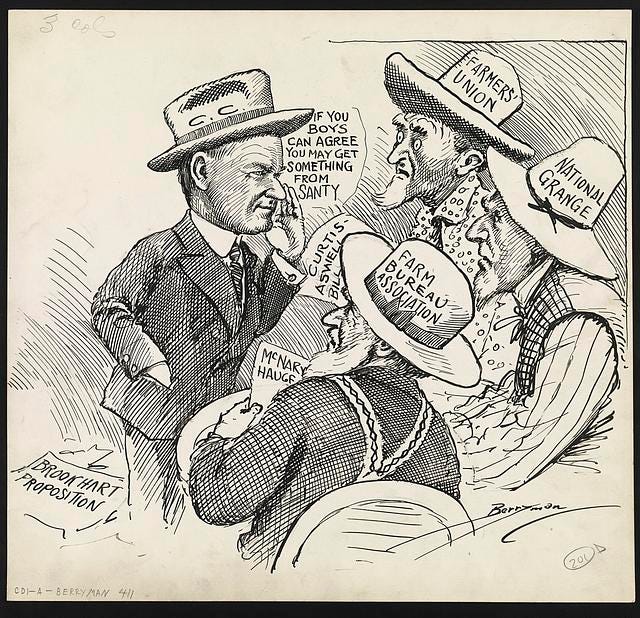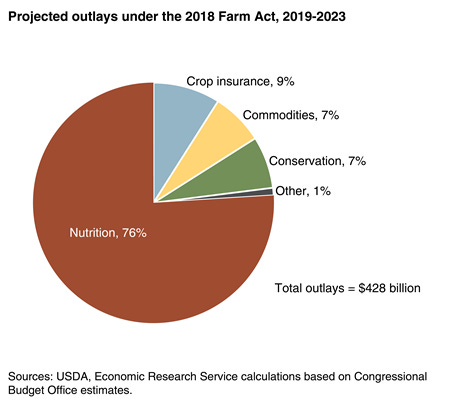What's So Important About a Farm Bill?
Before you decide to pass on a post about the farm bill because it's too wonky, remember, "eating is an agricultural act"
“The industrial eater is, in fact, one who does not know that eating is an agricultural act, who no longer knows or imagines the connections between eating and the land, and who is therefore necessarily passive and uncritical—in short, a victim.”
Wendell Berry
The farm bill has never been the bipartisan-Apple Pie-American Dream kind of legislation promised to us as a part American democracy.
That could be why we still don’t have an updated one.
The farm bill funds everything from baseline commodity prices, to nutrition programs such as the Supplemental Nutrition Assistance Program, to conservation programs and biofuel subsidies. The 2018 Farm Bill expired in 2023 and was renewed for one year.
Last week, I spent time on Capitol Hill interviewing farmers during the National Farmers Union fly-in. Their main objective? Tell Congress to pass a farm bill this year.
“I was a little more hopeful until we talked to Senator Ernst,” said Iowa farmer Joshua Manske. “She said [referencing the passage of the Farm Bill], ‘it’s going be a tough one.’ So that dimmed the hopes a little bit. But hope does spring eternal.” (See more about their reactions to meeting with D.C. legislators in my coverage for Barn Raiser).
But this isn’t some sign that the farm bill this year is more controversial than before. In fact, the first proposed farm bill passed the House and Senate in the 1920s but was vetoed by President Coolidge. It wouldn’t be until Iowa native Herbert Hoover took office that the federal government established the “Federal Farm Board.”

Like many things that have changed the course of American history, the farm bill was a New Deal era legislation. In 1933, Franklin D. Roosevelt passed the Agricultural Adjustment Act, which tied together agriculture and food programs. AAA provided subsidies for farmers to not plant on some of their land and even established school lunch programs by authorizing the government to buy agricultural products and give them away for free.

In 1936, the Supreme Court declared AAA unconstitutional because the act used federal dollars to inflate crop prices (by incentivizing farmers to plant less).
In 1938, a new Farm Bill was passed focused on soil conservation. This is the year Federal Crop Insurance also started.
Our last farm bill was passed in 2018 — 76% of those funds were intended for nutrition programs like SNAP, 9% for crop insurance, and 7% for conservation.
The “nutrition” piece of the piece largely provides funding for the 12.6% of U.S. residents relying on SNAP. The bill and also provides safeguards for the 3.4 million agricultural producers in the country. If a farm bill isn’t passed this year, Iowa Farmers Union President Aaron Lehman told me last week, it will be a “lost opportunity” for expanding the safety net and conservation programs.
Look at it this way. The farm bill has the power to conserve more land on farms, feed people, and keep family farms afloat. It also has the power to take all of those things away.
“There is, then, a politics of food that, like any politics, involves our freedom. We still (sometimes) remember that we cannot be free if our minds and voices are controlled by someone else. But we have neglected to understand that we cannot be free if our food and its sources are controlled by someone else. The condition of the passive consumer of food is not a democratic condition.”
Wendell Berry





Coolidge’s opposition to the Farm Bill was wise: Price supports distort the real costs of cheap food.
The general logic is: Commodity crop prices are artificially low —> This de facto subsidizes UPF and makes them dangerously cheap —> UPF price points distort consumer choice (spend $3 on Oreos or $5 on Spinach) —> Consumers shy away from the better whole foods —> This hurts farmers & health outcomes.
Additionally, the extensive subsidies for commodity crops make it comparatively more profitable to grow such crops than to grow less subsidized crops (e.g., specialty crops). This was an intentional policy decision from decades ago, as we all know. Issue is: This further increases the supply of commodity crops (pushing prices further down) and decreases the supply of other crops (keeping their prices up).
And there are numerous Farm Bill programs that subsidize commodity crops and thus deserve scrutiny, most notably (1) the effective reference prices and (2) federal crop insurance.
Now let me add: I desperately want to help America’s farms, and specifically those growing/raising the stuff that’s good for families. Price controls and subsidies are just the worst possible way of doing so.
Love an opening quote from Wendell Berry!